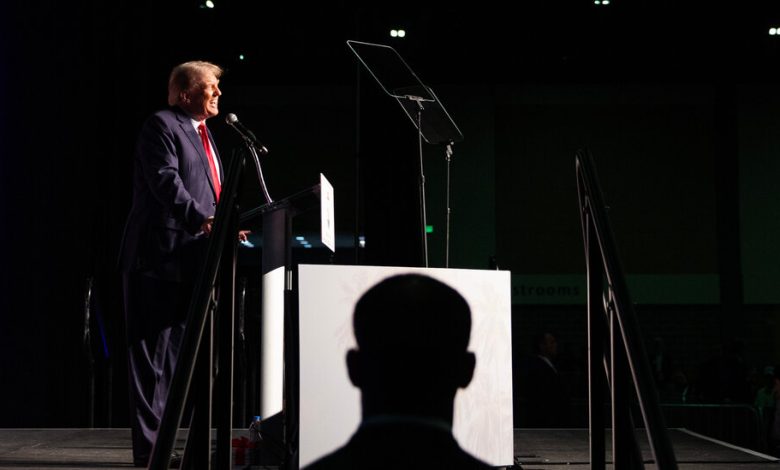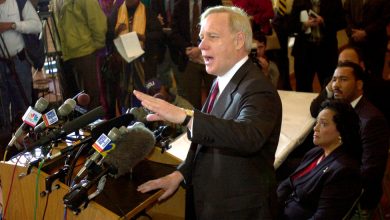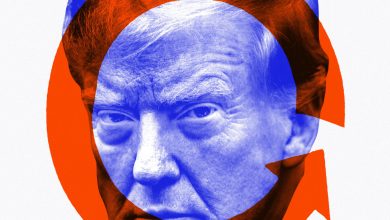Donald Trump Is Going to Get Someone Killed

Donald Trump’s life has been a master class in the evasion of consequences. Six of his businesses have declared bankruptcy but he is still acclaimed as a business visionary; he’s been married three times but is still beloved by evangelicals; he’s been impeached twice but still remains a leading candidate for president. For years, Mr. Trump’s critics have believed that a moment of accountability was just over the horizon, thanks to, say, a Bob Woodward takedown or a Robert Mueller investigation; disappointment followed.
Now, Mr. Trump confronts another moment of apparent peril as he begins to face his accusers in criminal and civil court proceedings. The verdicts in these cases remain months away, but he is reacting in apparent confidence that the consequences of his actions will, as ever, turn out well for him. But it’s equally important to ask how Mr. Trump’s response to his latest predicament will affect others, especially those who are now targets of his wrath.
Over the past two weeks, the judges in Mr. Trump’s civil fraud case in New York and his criminal prosecution in Washington have issued limited gag orders forbidding him from trying to intimidate witnesses and other participants in the trials. Mr. Trump is appealing at least one of the orders, but even if he abides by them, which is by no means certain, the directives do not prohibit the vast range of threats and attacks Mr. Trump has made and shows every sign of continuing to make. The former president’s current language represents an imminent threat to his rhetorical targets and those around them.
Mr. Trump has always employed invective as a political tool, but as his days of courtroom reckoning have arrived, his rhetoric has grown more menacing. He’s suggested that Gen. Mark Milley, the former chairman of the Joint Chiefs of Staff, could have been executed; that shoplifters should be shot; that the judge’s clerk in the civil case against him is Sen. Chuck Schumer’s girlfriend; and that “you ought to go after” the state attorney general who is prosecuting him. In language evoking Nazi eugenics, he has accused immigrants of “poisoning the blood of our country.”
Mr. Trump’s adversaries often look to the courts for relief, but there’s no remedy there for his tirades. The First Amendment protects all but the most explicit incitements to violence, so Mr. Trump has little reason to fear that prosecutors will bring charges against him for those remarks.
The most notorious moment of Mr. Trump’s presidency also demonstrated the limits of relying on the courts as a meaningful check on his own provocations. In his speech on the Ellipse on Jan. 6, 2021, Mr. Trump urged his supporters to “fight like hell,” and many did just that at the Capitol. But they paid a price, and he didn’t. In yet another example of Mr. Trump’s life without consequences, more than 1,000 people have been charged for their conduct on Jan. 6, and many if not most of them broke the law because they thought that’s what the president at the time wanted. Still, the special counsel Jack Smith refrained from charging Mr. Trump with inciting the violence, undoubtedly because of the Constitution’s broad protection for freedom of speech. Incitements like Mr. Trump’s, even if they are not crimes in themselves, can have dangerous consequences, as they did on Jan. 6.
Angry people, especially those predisposed toward violence, can be set off by encouragement that falls well short of the legal standard for criminal incitement. To see the consequences of such constitutionally protected provocation, one need only look to the case of Timothy McVeigh, who set off the bomb at the Alfred P. Murrah Federal Building in Oklahoma City that killed 168 people on April 19, 1995. More than a decade before the attack, when Mr. McVeigh was still in high school, he first read “The Turner Diaries,” a novel about a right-wing rebellion against the federal government. Earl Turner, the hero and narrator of the novel, ignites a civil war by setting off a truck bomb next to the F.B.I. building in Washington — the act that planted the idea for what Mr. McVeigh later did in Oklahoma City. But once Bill Clinton took office in 1993, McVeigh’s revulsion at the new president prompted him to move the idea from the back of his mind to a definite plan of attack.
Mr. McVeigh was specifically outraged at the F.B.I.’s raid on the Branch Davidian complex, near Waco, Texas, which led to the death of 82 Branch Davidians and four federal agents and ended on April 19, 1993, and at Mr. Clinton’s signing of a ban on assault weapons, which took place the following year.
Mr. McVeigh’s anger was boiling at a time of incendiary political language in the mid-1990s, when, for example, Newt Gingrich, who would go on to become speaker of the House in 1995, said: “People like me are what stand between us and Auschwitz. I see evil all around me every day.” In particular, on his long drives across the country, Mr. McVeigh became a dedicated listener to Rush Limbaugh, whose radio talk show was in its heyday. Mr. Limbaugh was saying things like, “The second violent American revolution is just about — I got my fingers about a quarter of an inch apart — is just about that far away.” Of course, all of this rhetoric, from the words of the novel to those of Mr. Gingrich and Mr. Limbaugh, was protected by the First Amendment.
One person who understood the possible connection between the language on the airwaves and the violence it spawned was Mr. Clinton himself, who had seen repeated examples of extreme right-wing violence during his days as governor of Arkansas. In a speech shortly after the Oklahoma City bombing, Mr. Clinton said, “We hear so many loud and angry voices in America today whose sole goal seems to be to try to keep some people as paranoid as possible and the rest of us all torn up and upset with each other.” He went on: “They spread hate. They leave the impression that, by their very words, that violence is acceptable … I’m sure you are now seeing the reports of some things that are regularly said over the airwaves in America today. Well, people like that who want to share our freedoms must know that their bitter words can have consequences.”
Then as now, from Mr. Limbaugh to Mr. Trump, the act of calling out their provocations produces the same cries of wounded innocence. In response to Mr. Clinton’s speech, Mr. Limbaugh denounced “irresponsible attempts to categorize and demonize those who had nothing to do with this. … There is absolutely no connection between these nuts and mainstream conservatism in America today.” Mr. Trump used the same rhetorical dodge regarding his responsibility for the violence he fomented on Jan. 6. In his answer to the report of the congressional committee that investigated the attack on the Capitol, he said in a post on his Truth Social website: “The unselect committee [sic.] did not produce a single shred of evidence that I in any way intended or wanted violence at our Capitol. The evidence does not exist because the claim is baseless and a monstrous lie.”
Mr. Trump, like Mr. Limbaugh before him, uses the Constitution’s broad protections for inflammatory speech as a shield against any sort of accountability. The implicit argument is that unless a criminal prosecution establishes a direct cause and effect between his words and the violence that follows, then there is no connection at all. But that isn’t true, nor can it be. Mr. Clinton was just reflecting common sense when he said, “words can have consequences,” and Mr. McVeigh’s story illustrates the effect that constitutionally protected words can have. But Mr. Trump never acknowledges that his words have any outcome other than those he chooses to recognize.
The temptation with Mr. Trump, for President Biden and others, has always been to ignore the former president’s more outrageous statements in favor of the high (or at least higher) road. But that restraint is a disservice to the public and, in all likelihood, bad politics, too. If Mr. Trump isn’t called out for his encouragement of violence before it actually takes place, that will bolster his proclamations of innocence when the worst happens; he shouldn’t have that opportunity. Mr. Trump’s statements represent an immediate danger to the targets of his rage and the public at large; it’s Mr. Biden’s responsibility, as well as a political opportunity, to issue that warning.
Mr. Trump has never respected the norms of political behavior and there’s little reason to think gag orders will provide meaningful discipline either. As on Jan. 6, his supporters shed traditional rules as well. The day is fast approaching when someone picks up a gun or builds a bomb and then seeks to follow through on Mr. Trump’s words. If and when that happens, he will say that he did not specifically direct or cause the violence, and he will probably escape without criminal charges — but the blood will be on his hands.
Jeffrey Toobin is the author of “Homegrown: Timothy McVeigh and the Rise of Right-Wing Extremism.”
The Times is committed to publishing a diversity of letters to the editor. We’d like to hear what you think about this or any of our articles. Here are some tips. And here’s our email: [email protected].
Follow The New York Times Opinion section on Facebook, Twitter (@NYTopinion) and Instagram.




